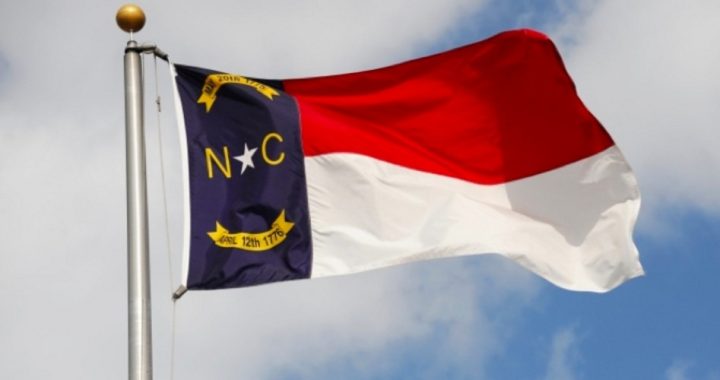
The North Carolina legislature has shelved a proposed resolution declaring that the state has the authority to establish an official religion. According to the Charlotte Observer, the office of House Speaker Thom Tillis said the resolution, which asserted that North Carolina and its counties are not bound by the First Amendment with regard to religious expression, would not be voted on, meaning that it is essentially dead. Fox News reported that the resolution had been introduced in response to a lawsuit filed by the ACLU against North Carolina’s Rowan County over the custom of its board of commissioners to open government meetings with Christian prayer. The secular legal group had accused the commissioners of violating the First Amendment by praying in Jesus’ name.
State Representative Harry Warren, one of chief sponsors of the resolution introduced on April 1, said the measure was not intended as a serious effort to establish an official religion, but rather a statement of support for the county. North Carolina’s Salisbury Post quoted Warren as saying that the resolution was “on my part a demonstration of support [for Rowan County] more than an effort to have the courts revisit everything.”
He pointed out that the constitutional doctrine of separation of church and state “has been liberally defined and interpreted” by federal courts, and the resolution was an effort to offer a more conservative understanding. “I didn’t expect it to go anywhere,” Warren admitted. “Quite often bills go there and never come out.”
House Joint Resolution 494 notes that while the federal judiciary has “incorporated states, municipalities, and schools into the Establishment Clause prohibitions on Congress,” the Tenth Amendment “prohibits the federal government and prohibits the federal courts from expanding the powers of the federal government beyond those powers which are explicitly enumerated.”
The resolution points out that because the Constitution does not grant the federal government or the courts “the power to determine what is or is not constitutional … by virtue of the Tenth Amendment … the power to determine constitutionality and the proper interpretation and proper application of the Constitution is reserved to the states and to the people.” By virtue of these constitutional stipulations, “each state in the union is sovereign and may independently determine how that state may make laws respecting an establishment of religion,” the resolution continues.
Noting that Rowan County had requested the legislature’s assistance in taking a stand against the ACLU’s legal attack, the proposed resolution concludes that because the Constitution “does not prohibit states or their subsidiaries from making laws respecting an establishment of religion [the] North Carolina General Assembly does not recognize federal court rulings which prohibit and otherwise regulate the State of North Carolina, its public schools, or any political subdivisions of the State from making laws respecting an establishment of religion.”
As news of the resolution gained momentum around the nation, some new sites reported it as a “bill” or “legislation” that North Carolina’s legislators were pushing as a serious effort to establish an official religion in the state. But even before the legislature shelved the proposed resolution, State Representative Warren, who represents Rowan County, emphasized that the resolution “is not an effort to establish a state religion and should not be interpreted as such.”
In its reporting the Charlotte Observer pointed out that, unlike actual legislation, resolutions have “no lasting effect beyond the legislative sessions, do not require the governor’s signature, and are commonly used to create study commissions or honor groups like veterans.” In other words, if passed, the resolution would not have the power of a law.
Another of the resolution’s sponsors, State Representative Carl Ford, told the Salisbury Post that he was surprised by how much national attention the measure attracted. “We’re not starting a church,” he said. “We’re not starting a religion. We’re supporting the county commissioners in their freedom of speech.”
Nonetheless, some groups appeared to miss the symbolic nature of the resolution, including the liberal People for the American Way, whose spokesman Michael Keegan declared with bluster: “There’s no question that any attempt to establish an official state religion is blatantly unconstitutional. That’s true whether it’s North Carolina or the federal government.”
Similarly, the Baptist Joint Committee for Religious Liberty appeared to miss the intent of the resolution, declaring that the effort on the part of the concerned lawmakers was “just plain wrong.” Said the Baptist committee in a statement: “Most Americans appreciate religious freedom and are thankful for our constitutional tradition that protects both the free exercise of religion and guards against its establishment.” The committee went on to label the centuries-long tradition of legislative prayer across America as nothing less than “controversial,” while declaring that “government declaring an official state religion is off the charts.”
By contrast, a few North Carolina religious leaders fully understood the intent of the lawmakers in offering the resolution, applauding their effort to stand up for the rights of government leaders to do things like pray and read Scripture in the public square. “We really take the wrong approach when we just try to tell people that they can’t pray in Jesus’ name,” said Charlotte Baptist pastor Mark Harris, adding that “I don’t think Christians should be required to check their faith at the door when they go in to a public arena.” Franklin Graham of the Charlotte-based Billy Graham Evangelistic Association agreed, pointing out that “having a religious prayer to open a meeting is not state-sponsored religion.”



